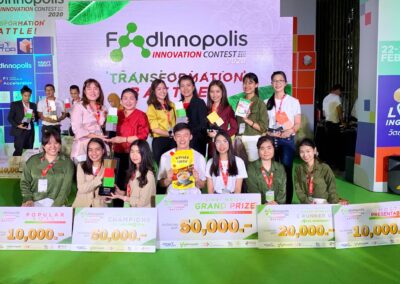Change Language: ภาษาไทย
Bachelor of education
Food science and innovation
ระยะเวลา: 3.5 ปี
จำนวนรับเข้า: 40 คน
คุณสมบัติผู้สมัครเข้าศึกษา:
- ผู้สมัครต้องเป็นผู้สำเร็จการศึกษาชั้นมัธยมศึกษาปีที่ 6 สายสามัญ กลุ่มสาระการเรียนรู้วิชาวิทยาศาสตร์ ฟิสิกส์ เคมี ชีวะ ต้องเรียนรายวิชาพื้นฐานและรายวิชาเพิ่มเติม รวมกันไม่น้อยกว่า 22 หน่วยกิต กลุ่มสาระการเรียนรู้คณิตศาสตร์ต้องเรียนรายวิชาพื้นฐานและรายวิชาเพิ่มเติม รวมกันไม่น้อยกว่า 12 หน่วยกิต
จำนวนหน่วยกิต:
- จำนวนหน่วยกิต รวมไม่น้อยกว่า 134 หน่วยกิต
- วิชาศึกษาทั่วไป 12 หน่วยกิต
- วิชาเฉพาะ ไม่น้อยกว่า 116 หน่วยกิต
- วิชาเลือกเสรี ไม่น้อยกว่า 6 หน่วยกิต
ค่าเล่าเรียน:
- ภาคการศึกษาละ 17,300 บาท (เหมาจ่าย)
สถานที่ศึกษา:
คณะวิทยาศาสตร์และเทคโนโลยี มหาวิทยาลัยธรรมศาสตร์ ศูนย์รังสิต
ติดต่อหลักสูตร:




![]() @foodfintu
@foodfintu
Also known as FIN, the Food Science and Innovation program is a new strain of food science and technology program aimed at transforming students into food innovators with real in-depth knowledge who can perform actual work and solve actual problems. Training is provided in food industrial factories to produce people who can meet the demands of the food production industry and who can apply their knowledge in food science and technology in other sciences as appropriate while using creativity and innovations to increase the value of food products and training thinking processes to create innovations in preparation for starting food businesses.
Program Description
The subjects to be learned in the FIN program include basic food processing industry, food processing technologies, molecular biology in food and innovations, food chemistry innovations, nutrition for food designers, food business entrepreneurial skills, food product innovation development, food packaging innovations, etc.
The program has cut down on classroom hours to increase actual training and practice hours, so the program can be completed within 3.5 years.
Internships or Cooperative Education
Internships will take place at a food processing industrial factory toward the end of the third year to the fourth year for a period of 10-12 months in various departments such as QC, QA, Production and RD, with emphasis placed on actual workplace experience.
Further Studies
Further studies are possible on the master level in human resources development and food product innovations, food science and technology, food product development, management and marketing and others.
Target Occupations After Graduation
Students will be able to pursue occupations related to the food processing industry in the public sector and the private sector with positions including food product researcher and developer, production controller and planner, and food safety and quality assurer at a research institute, food industrial factory, restaurant business, hotel or airline kitchen, while work with government agencies may include work with the FDA, Department of Internal Trade, Department of International Trade Promotion, and private businesses may include food production and processing businesses on the SME level or food industrial factories, food additive import and distribution business or food product export business, etc.
“Really know. Really do. Really solve problems. Skill training in preparation for real work.”


